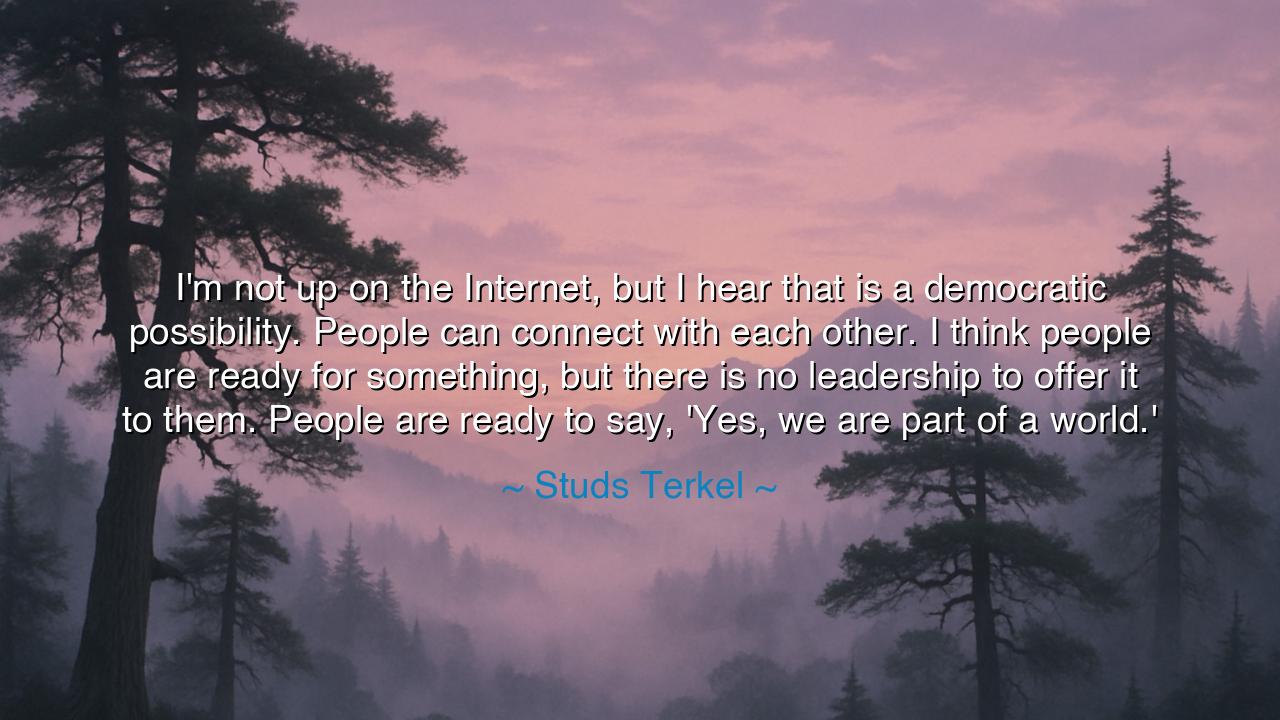
I'm not up on the Internet, but I hear that is a democratic
I'm not up on the Internet, but I hear that is a democratic possibility. People can connect with each other. I think people are ready for something, but there is no leadership to offer it to them. People are ready to say, 'Yes, we are part of a world.'






The words of Studs Terkel — “I'm not up on the Internet, but I hear that is a democratic possibility. People can connect with each other. I think people are ready for something, but there is no leadership to offer it to them. People are ready to say, ‘Yes, we are part of a world.’” — echo like a call from one age to the next. Spoken by a man rooted in the old world of radio, books, and conversation, these words foresaw the dawn of a new age — the age of the Internet, where the power to speak and to listen would no longer belong solely to governments, corporations, or media giants, but to the people themselves. Yet within his hope is also a warning: that connection without leadership, and unity without direction, may awaken yearning without fulfillment.
In the style of the ancients, we may say that Terkel saw in the web of wires and screens the makings of a modern agora — a global meeting ground, where ideas could flow like water between every tribe and tongue. In this, he perceived what he called a “democratic possibility” — not democracy as a system of voting, but as a living spirit of equality, of voices rising side by side, of people finding one another across barriers once thought eternal. It was a vision of humanity reclaiming its voice, long silenced by the noise of power. Yet Terkel, a man of wisdom and age, knew that possibility is not destiny. For democracy without vision, and unity without purpose, are like a ship unanchored — capable of great voyages, yet easily swept away by the tides.
The origin of this quote rests in the final years of Studs Terkel’s life — a time when the world was shifting from the analog to the digital, and he, a lifelong chronicler of the human spirit, watched from the shore as a new generation sailed into uncharted waters. Terkel, born in 1912, had spent his life gathering the voices of ordinary people, believing that history is not written by kings but by the multitudes who live, labor, and dream. When he spoke of the Internet, he recognized it as an instrument that could finally bring those voices together — a new kind of global conversation. But he also lamented that while the people were ready to unite, leadership, in its truest moral form, was nowhere to be found.
He sensed, as few did, the paradox of the digital age: that connection could coexist with loneliness, and communication with confusion. “People can connect with each other,” he said — and indeed, they have. Yet connection alone is not communion. The ancients would have said that the voice must be guided by wisdom, and the crowd by vision, or else the very gift of speech becomes a curse. Terkel’s concern was not that technology would fail, but that humanity might use it without purpose — that we would build a world of talk without listening, of motion without meaning.
Consider the example of the Arab Spring, which unfolded only a few years after Terkel’s passing. The Internet became the torch that illuminated the cries of millions, igniting revolutions through shared hope. People who had never met stood together, united by their yearning for freedom. Yet in the aftermath, many nations fell into chaos, for the people had found connection, but not yet direction. It was the very prophecy Terkel had uttered — that a generation might be ready for transformation, yet lacking the leadership and moral compass to carry it through.
In his words, “People are ready to say, ‘Yes, we are part of a world,’” lies the eternal dream of humanity: the desire to transcend the smallness of self and the boundaries of nation, to see ourselves as one family under the same sky. This is not merely political — it is spiritual. It is the same truth that Socrates taught when he called himself not an Athenian, but a citizen of the world; the same truth that Martin Luther King Jr. proclaimed when he spoke of a “network of mutuality” binding all people together. Terkel’s statement reminds us that the time for global consciousness has come — but the challenge lies in awakening the leaders, the thinkers, and the dreamers who will guide that consciousness toward peace and justice.
Thus, the lesson endures: connection must serve compassion, and technology must serve truth. Each of us must become both student and leader — willing to listen deeply, yet brave enough to act when the moment calls. The Internet, that vast ocean of voices, will not save us unless we navigate it with purpose. We must not wait for leadership from above, but cultivate it within ourselves. For every age calls forth its own shepherds — not those who command by power, but those who guide by example, who speak not for gain but for the good of all.
So let this be the teaching for future generations: that the tools of our age, however powerful, are only as noble as the hands that wield them. Be connected, but be conscious. Be global, but remain human. And when you raise your voice into the chorus of the world, let it not be an echo, but a light — the kind of light that turns mere possibility into transformation, and mere connection into true belonging.






AAdministratorAdministrator
Welcome, honored guests. Please leave a comment, we will respond soon